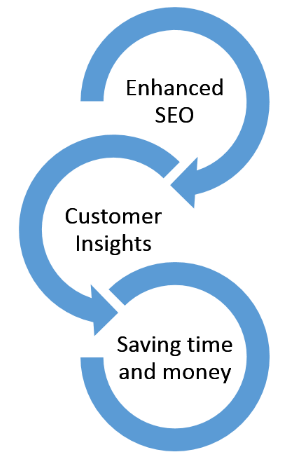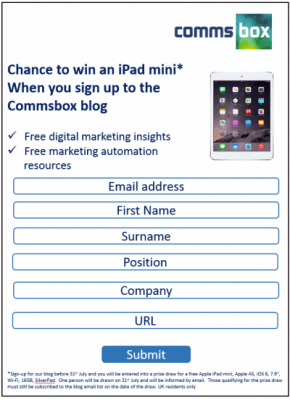 Marketing automation is any software package or web development that allows an organisation to automate some or all of its online communications. Usually these marketing communications are triggered by the action of a website visitor, for example a visit to a certain webpage or filling out a form.
Marketing automation is any software package or web development that allows an organisation to automate some or all of its online communications. Usually these marketing communications are triggered by the action of a website visitor, for example a visit to a certain webpage or filling out a form.
If you think about Amazon, you'll quickly realise that marketing automation is not new. For as long as we can remember Amazon and other big brands have been sending personalised, automated emails and delivering personalised web copy. What is relatively new is the ability for smaller companies to target individuals with relevant, timed communications triggered by online consumer behaviour.
So we can think of marketing automation in a number of ways. Firstly there is bespoke automation, the kind that big corporates will invest in, where the customer journey is carefully mapped out, and individual customers are treated as a market of one. Secondly there are all-in-one marketing automation software solutions that bring marketing automation to smaller companies as a standard package. And lastly there are offerings, such as CommsBox, that can offer the price competitiveness of an off-the-shelf package with some bespoke elements if required.
A good marketing automation package gives businesses an effective way to stimulate, capture and nurture leads online. Marketing automation software varies from supplier to supplier, but will often contain a combination of email marketing, content marketing, content management, SEO tools and list management, all wrapped up with the ability to automatically trigger time based or action based communications.
A Typical Customer Journey Using Marketing Automation
A typical marketing automation campaign starts with a digital marketing activity, for example a social media post, display advertising or search engine marketing that leads a prospect to a landing page. The visitor is then taken on an automated journey. An example is given in the diagram below.

The visitor is often incentivised, perhaps with some motivational offer, to leave their contact details as part of a lead nurturing process. The contact’s details are then captured into a database which is then used in future marketing campaigns. Marketing automation software allows the business to use their contact database, in conjunction with visitor tracking data, to create a personalised customer journey for each and every visitor. Personalised messages, most often emails, are sent automatically as a result of triggers, such as filling in a form, visiting a web page, or even a lack of interaction over a specified period of time.
What are the benefits of marketing automatio n?
n?
According to Econsultancy (2015) the majority of companies they surveyed (88%) were very clear or quite clear about the benefits of marketing automation including:
- More relevant communication
- Increased customer engagement
- More timely communication
- Opportunities for cross-sell and up-sell
- Saving Time
- Increased revenue.
In our own research with UK companies we identified three key benefits that came up time and again.
Enhancing SEO Reputation
Marketing automation is in fact part of a bigger content marketing strategy. It is often the existence of blogs and other creative content, such as videos, or surveys that stimulates a prospect to visit a website in the first place. A marketing automation package that enables businesses to easily add content to their web presence, and distribute that content easily to their prospects adds to the sheer volume of relevant content on the organisation’s website. Relevant, timely, up to date content is attractive to search engines and stimulates further traffic. This is the essence of what is sometimes called “Inbound marketing”.
Detailed Customer Insights
A strong marketing automation campaign has as one of its goals, the capture of customer data. Usually this happens on a landing page that incorporates a form, or a pop-up box. This is the start of that customer’s journey. Marketing automation can then be used to trigger further offers, that may e ncourage the contact to augment their data with further information.
ncourage the contact to augment their data with further information.
Once a visitor has filled in a form, a good marketing automation package will then start to track that visitor every time they visit the website. The software is then able to augment data about that visitor, using pages visited and actions taken as triggers for further communications. You can then gauge interest of prospects from the visitor's engagement with the website rather than waiting for an elusive response to an email.
This data once captured enables the company to understand customers at an individual level at a glance, as well as building up a picture on a micro and macro level. Understanding the customer is after all at the very heart of meeting customer needs profitably.
This detailed information about individual customers gives power and control to the marketer that they can then use to make sure that future communications (online or offline) are more relevant, personalised and engaging.
By having a finer level of granularity in observing how contacts are interacting with your web presence, you can learn what customers are actually interested in, test concepts, learn again from behaviour and continue to refine campaigns accordingly for greater commercial success.
Saving Time and Money
A marketing automation approach can be a less labour intensive way of understanding customers, and offers the prospect of lower cost promotion. Businesses we spoke to saw particular benefits in using marketing automation to handle the larger volume, lower value, accounts. This would leave costly sales resource free to spend their focus on larger accounts.
Ease of use was something we heard time and time again. Marketing automation can make it easier to communicate with large numbers of prospects and customers. Where marketing automation systems are cloud based, companies also benefit from being able to work on their campaigns remotely. This is helpful for small organisations that may employ a range of people working from home, or travelling.
Lastly, an integrated marketing automation package can replace a vast array of individual software tools, for example CRM, CMS and emailing programmes, with just one tool and one place to keep customer data. By putting resources of time and money into one tool the organisation gains rewards in efficiency and effectiveness.
Why CommsBox for Marketing Automation?
The key reasons for choosing CommsBox for marketing automation are:
- As a British company we are easy to find and easy to get to know. Many marketing automation companies are not based in the UK and therefore are too remote for businesses that are located here.
- Flexibility and the agility to offer bespoke elements. Many of our customers want something slightly different to the off-the-shelf packages available. We are able to give the cost effectiveness of a packaged product, with the flexibility of adding bespoke components.
- CommsBox has an easy to use intuitive interface, so little technical knowledge is needed.
- CommsBox is available either as an integral part of a CommsBox responsive website, or as a plug-in for your existing website.
- CommsBox is the flagship product of Yellowhawk Ltd that has been established since 2002 serving many UK organisations from large Government departments through to smaller local entrepreneurs.
If you'd like to find out how marketing automation can work for your business, please contact us. We'd love to talk to you.

 Caroline is Marketing Director for
Caroline is Marketing Director for